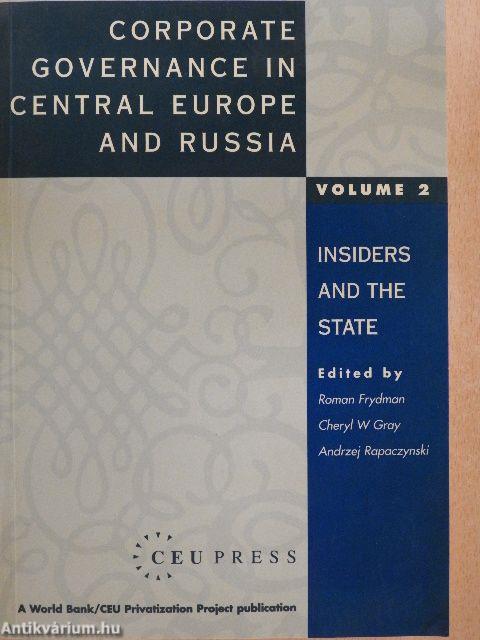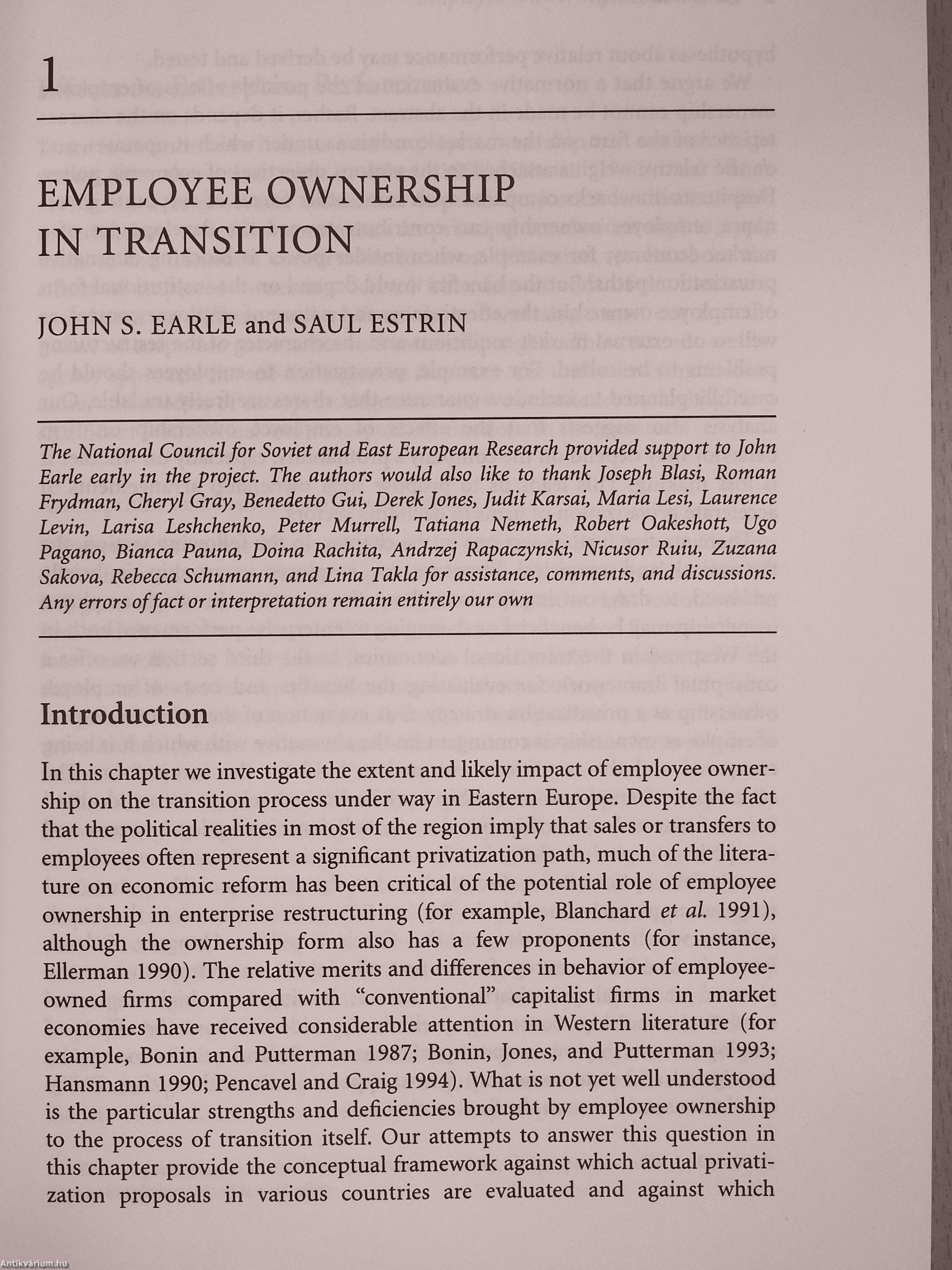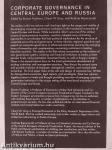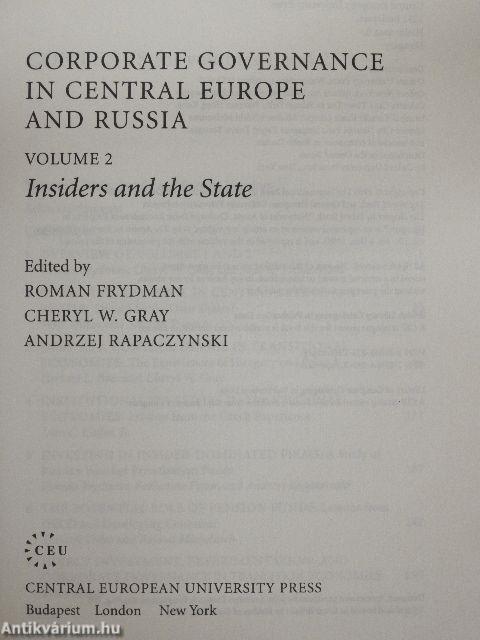1.067.681
kiadvánnyal nyújtjuk Magyarország legnagyobb antikvár könyv-kínálatát

VISSZA
A TETEJÉRE
JAVASLATOKÉszre-
vételek
Corporate Governance in Central Europe and Russia 2.
Insiders and the State
| Kiadó: | Central European University Press |
|---|---|
| Kiadás helye: | Budapest |
| Kiadás éve: | |
| Kötés típusa: | Ragasztott papírkötés |
| Oldalszám: | 310 oldal |
| Sorozatcím: | |
| Kötetszám: | |
| Nyelv: | Angol |
| Méret: | 23 cm x 16 cm |
| ISBN: | 1-85866-036-X |
naponta értesítjük a beérkező friss
kiadványokról
naponta értesítjük a beérkező friss
kiadványokról
Előszó
TovábbFülszöveg
CORPORATE GOVERNANCE IN CENTRAL EUROPE AND RUSSIA
Edited by Roman Frydman, Cheryl W Gray, and Andrzej Rapaczynski
The studies in this hvo-volume work shed new light on the range and viability of the emerging corporate governance institutions in the transitional economies of Central Europe and Russia. While ownership reform was one of the earliest axioms of postcommunist transition, countries adopted many contrasting approaches to privatization that had profound implications for the structure of corporate ownership and governance. In these volumes, regional specialists and experts on corporate governance in advanced economies examine the emerging forms of ownership and complementary monitoring institutions in leading transition countries. The studies in the first volume concentrate on the creation of new governance systems, covering such financial institutions as banks, private pension funds, and privatization investment funds, as well as foreign investors. Those in the second... Tovább
Fülszöveg
CORPORATE GOVERNANCE IN CENTRAL EUROPE AND RUSSIA
Edited by Roman Frydman, Cheryl W Gray, and Andrzej Rapaczynski
The studies in this hvo-volume work shed new light on the range and viability of the emerging corporate governance institutions in the transitional economies of Central Europe and Russia. While ownership reform was one of the earliest axioms of postcommunist transition, countries adopted many contrasting approaches to privatization that had profound implications for the structure of corporate ownership and governance. In these volumes, regional specialists and experts on corporate governance in advanced economies examine the emerging forms of ownership and complementary monitoring institutions in leading transition countries. The studies in the first volume concentrate on the creation of new governance systems, covering such financial institutions as banks, private pension funds, and privatization investment funds, as well as foreign investors. Those in the second volume focus on the more spontaneous development of existing institutions and management practices. They discuss the present scene and possible evolution of employee, managerial, interfirm, and residual state ownership. The final paper looks at the role and design of corporate law. Written by distinguished economists, legal experts, and sociologists, these two volumes together present a timely and thought-provoking overview of emerging corporate governance institutions in the unique setting of the transitional economies of Central Europe and Russia.
Roman Frydman is Professor of Economics at New York University and Co-Director of the Central European University Privatization Project. Involved in the Eastern European privatization process from its beginning, he has co-authored, with Andrzej Rapaczynski, a number of publications on privatization in postcommunist societies. He has also published articles on international financial markets and market behaviour under uncertainty.
Cheryl W. Gray is Principal Economist in the Policy Research Department of the Wodd Bank. She has worked extensively and written widely on legal reform and enterprise restructuring in Eastern Europe.
Andrzej Rapaczynski is Professor of Law at Columbia University and Co-Director of the Central European University Privatization Project. He was an adviser to the Polish and Russian paHiaments on drafting new constitutions and has written, with Roman Frydman, a number of articles on privatization. He is also the author of Nature and Politics, a book on liberal philosophy. Vissza
Témakörök
- Közgazdaságtan > Gazdaságpolitika
- Közgazdaságtan > Közgazdasági elméletek > Egyéb
- Közgazdaságtan > Gazdaságtörténet > Tanulmányok
- Idegennyelv > Idegennyelvű könyvek > Angol > Közgazdaságtan > Gazdaságpolitika
- Idegennyelv > Idegennyelvű könyvek > Angol > Közgazdaságtan > Gazdaságtörténet > Tanulmányok
- Közgazdaságtan > Vállalkozások > Általában
- Idegennyelv > Idegennyelvű könyvek > Angol > Közgazdaságtan > Közgazdasági elméletek > Egyéb
- Idegennyelv > Idegennyelvű könyvek > Angol > Közgazdaságtan > Vállalkozások > Általában
Megvásárolható példányok
Nincs megvásárolható példány
A könyv összes megrendelhető példánya elfogyott. Ha kívánja, előjegyezheti a könyvet, és amint a könyv egy újabb példánya elérhető lesz, értesítjük.








